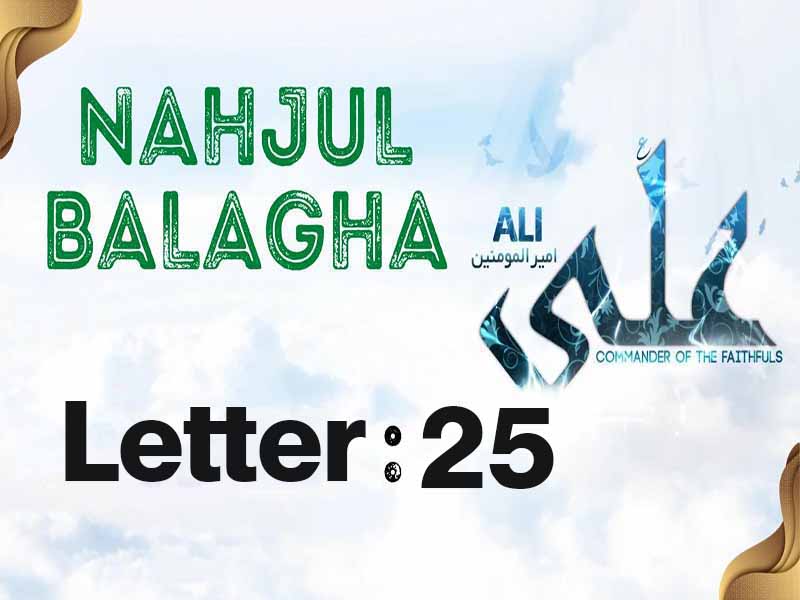دستورالعمل امام (ع) به مأموران جمع آوری مالیات در سال 36 هجری
(ما بخشی از این وصیت را آوردیم تا معلوم شود كه امام اركان حق را به پا میداشت و فرمان به عدل صادر میكرد، در كارهای كوچك یا بزرگ، با ارزش یا بی مقدار.)
با ترس از خدایی كه یكتاست و همتایی ندارد حركت كن. در سر راه هیچ مسلمانی را نترسان، یا با زور از زمین او نگذر، و افزونتر از حقوق الهی از او مگیر. هرگاه به آبادی رسیدی، در كنار آب فرود آی، و وارد خانه كسی مشو، سپس با آرامش و وقار به سوی آنان حركت كن، تا در میانشان قرار گیری؛ به آنها سلام كن، و در سلام و تعارف و مهربانی كوتاهی نكن. سپس می گویی: «ای بندگان خدا! مرا ولی خدا و جانشین او به سوی شما فرستاده، تا حقّ خدا را كه در اموال شماست تحویل گیرم، آیا در اموال شما حقّی است كه به نماینده او بپردازید؟. » اگر كسی گفت: نه، دیگر به او مراجعه نكن، و اگر كسی پاسخ داد: آری، همراهش برو، بدون آن كه او را بترسانی، یا تهدید كنی، یا به كار مشكلی وادار سازی، هرچه از طلا و نقره به تو رساند بردار، و اگر دارای گوسفند یا شتر بود، بدون اجازه اش داخل مشو، كه اكثر اموال از آن اوست. آنگاه كه داخل شدی مانند اشخاص سلطه گر، و سختگیر رفتار نكن، حیوانی را رَم مده، و هراسان مكن، و دامدار را مرنجان. حیوانات را به دو دسته تقسیم كن و صاحبش را اجازه ده كه خود انتخاب كند، پس از انتخاب اعتراض نكن، سپس باقیمانده را به دو دسته تقسیم كن و صاحبش را اجازه ده كه خود انتخاب كند و بر انتخاب او خرده مگیر، به همین گونه رفتار كن تا باقیمانده، حقّ خداوند باشد. اگر دامدار از این تقسیم و انتخاب پشیمان است، و از تو درخواست گزینش دوباره دارد، همراهی كن، پس حیوانات را درهم كن، و به دو دسته تقسیم نما، همانند آغاز كار، تا حقّ خدا را از آن برگیری. و در تحویل گرفتن حیوانات، حیوان پیر و دست و پا شكسته، بیمار و معیوب را به عنوان زكات نپذیر، و به فردی كه اطمینان نداری، و نسبت به اموال مسلمین دلسوز نیست، مسپار، تا آن را به پیشوای مسلمین برساند و او در میان آنها تقسیم گرداند. در رساندن حیوانات، آن را به دست چوپانی كه خیرخواه و مهربان، امین و حافظ، كه نه سختگیر باشد و نه ستمكار، نه تند براند و نه حیوانات را خسته كند، بسپار، سپس آنچه از بیت المال جمع آوری شد برای ما بفرست، تا در نیازهایی كه خدا اجازه فرموده مصرف كنیم. هرگاه حیوانات را به دست فردی امین سپردی، به او سفارش كن تا: «بین شتر و نوزادش جدایی نیفكند، و شیر آن را ندوشد تا به بچّه اش زیانی وارد نشود. در سوار شدن بر شتران عدالت را رعایت كند، و مراعات حال شتر خسته یا زخمی را كه سواری دادن برای او سخت است بنماید. آنها را در سر راه به درون آب ببرد، و از جادّه هایی كه دو طرف آن علف زار است به جادّه بی علف نكشاند، و هرچند گاه شتران را مهلت دهد تا استراحت كنند، و هرگاه به آب و علفزار رسیدند، فرصت دهد تا علف بخورند و آب بنوشند .» تا آنگاه كه به اذن خدا بر ما وارد شوند، فربه و سرحال، نه خسته و كوفته، كه آنها را بر اساس رهنمود قرآن، و سنّت پیامبر (ص) تقسیم نماییم. عمل به دستورات یاد شده مایه بزرگی پاداش و نیز هدایت تو خواهد شد، ا نشاءالله.
[ Directions to assessors and collectors of Zakat. ]
These directions clearly show what form of regime it was that Imam Ali (a) wanted to introduce. It was not to be a regime whose officers had an upper hand and were fattened on public money. It was to be a regime where the governed and the tax-payers were at premium. It was their convenience for which the State was to function. It was a welfare-state working solely for the welfare of the people living under its rule, a regime where the rich cannot get richer while the poor are made poorer; a regime where canons of religion hold the balance between the governed and the ruler. Do not give up fearing Allah who has no partner. Do not let the Muslim grieve (over their lot of having you as their ruler) and do not approach them in a way as to make your approach hateful to them. Do not tax them more than what is actually due from them to Allah. When you reach a group of people (tribe or village) to assess a tax on them, then stay only at their watering-place (a well or water-hole the most convenient place for stay in desert regions) and do not stay in their houses. Then go to them maintaining your dignity and prestige and when you are in their midst, wish them peace and blessings of Allah and show due respect to them. Tell them that the Caliph of Allah has sent you to collect from them their dues to Allah. Ask them whether they possess enough means to pay the dues of Allah that you may gather them and pass them on to His Caliph. If somebody tells you that he does not possess enough wealth to make him liable to pay taxes then do not worry him and accept his plea. If someone tells you that he is in a position to pay Zakat, then go with him to his house, field or pasture (because Zakat was then collected in coins as well as in kind). But do not frighten him or make him nervous and do not behave with them with undue harshness or tyranny. Then accept the gold or silver which he offers. (Here are the instructions regarding the number of cattle to be assessed for Zakat). If he has cows, bulls, goats and camels then do not enter the herd without his permission because most of it belongs to him (it is not part of Zakat). If you have to enter the herd then do not enter like the one who is coming there to take possession of the cattle. Do not tyrannize the owner, do not frighten the cattle so as to make them disperse. Do not make the owner feel anxious or sorry for them. Then divide the herd into two parts and allow the owner to select the one for himself. If he selects one part for keeping himself, then do not object to it. Again divide the part which he has left for the share of Zakat to be selected from out of these two parts, again allow him to select the lot which he wants to retain for himself. Never object to his selection (because it is the assessor who is dividing them in equal lots; therefore, the selection between the two lots should naturally rest with the owner). Continue like that until you arrive at the lot which constitutes the share of Allah (Zakat) then take possession of it. Even if, in spite of all these precautions, he thinks the division was unfair and unjust, then mix the whole lot and go through the process once again as I have already explained to you till you arrive at the share of Zakat to the satisfaction of everybody concerned. Remember you have not to accept old and diseased camels or such as have their limbs damaged. Entrust this lot only to such person who is honest and who can be trusted and who can guard the property of the Muslims sympathetically till it reaches their ruler and caliph so that it may be distributed equitably among the Muslims. I want to instruct you once again that you should not entrust these goods and animals to anyone who is not honest. Entrust them to one who is trustworthy and who is of a kind and sympathetic disposition so that he may not treat the animals cruelly and may not starve them or tire them out during the transit. Instruct him not to separate a she-camel from its young, not to milk it so much that nothing is left for its young one and not to ride them harshly or to overburden them with heavy loads. He should ride them in turns so that those who have been already ridden may have an easy journey. He should not drive them fast and should avoid harshness. He should always give them enough rest at watering places. They should not be driven through deserts. As far as possible green lands and well-wooded regions should be selected for the passage. Thus every care should be taken so that they reach their destination in healthy and robust condition without having received any harsh and brutal treatment on the way so that I may distribute them according to the Orders of Allah and the Holy Prophet (s). Verily, the collection of the dues of Allah in the way that I have explained to you is a pious deed and a religious duty which will carry its reward before the Lord.
فایل صوتی فارسی مربوط به این نامه را از لینک ذیل دانلود نمایید:
Download: Nahjul-Balagah-Letter-25




































نظرات کاربران